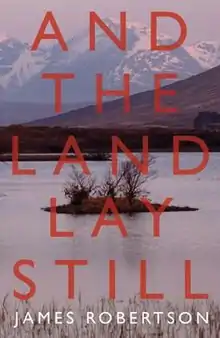And the Land Lay Still
And the Land Lay Still is the fourth novel by Scottish novelist and poet James Robertson. Upon publication in 2010 it was widely praised for its breadth of exploration of Scottish society in the latter half of the 20th century.
 2010 UK hardback edition | |
| Author | James Robertson |
|---|---|
| Country | Scotland |
| Language | English, Scots |
| Genre | Literary fiction |
| Publisher | Hamish Hamilton |
Publication date | 2010 |
| Media type | Print (hardback and paperback) |
| Pages | 688 |
| ISBN | 978-0-241-14356-8 |
| OCLC | 619089421 |
| Preceded by | The Testament of Gideon Mack |
Plot summary
The novel’s narrative is shaped around the portfolio of the late photographer Angus Pendreich. His son Michael is involved in the establishment of a new exhibition of his renowned father’s work.
The book focuses on the characters presented in these photographs, which span post-war Scotland across geographies and social classes from the homeless to senior politicians. Their disparate stories present a collage that highlights the highs and lows of modern Scottish society.[1]
Critical reception
The award-winning epic novel received near-unanimous critical acclaim in the mainstream British press.
For The Independent, the “dizzying grand opus” was “eminently readable” and successful in showcasing “an alternative history of the country told by its everyday people instead of its movers and shakers”.[2]
The Observer said that Robertson had “caught something of the sheer bloody-minded craving for self-sabotage in the Scottish soul so accurately it's painful”.[3] The Herald was impressed by “a state-of-the-nation novel with a Dickensian scope”.[4]
The Daily Telegraph was impressed by the book’s ability to meld “engrossing individual storylines” with “cultural shifts such as the birth of Scottish nationalism, the death of industry, the sexual revolution and the boom in North Sea oil”.[5] The New Statesman noted that four years’ worth of research had gone into the book and finished its review with the line: “It’s some achievement”.[6]
Writing in The Guardian, the writer Irvine Welsh said of the "highly ambitious" book that it “represents nothing less than a landmark for the novel in Scotland, and underlines the author's position as one of Britain's best contemporary novelists”.[7] Scotland First Minister Alex Salmond selected the novel as his book of the year for 2010, telling the Scotland on Sunday that it was “outstanding”, “important”, and the author’s finest work.[8]
The novel won the 2010 Scottish Book of the Year Award[9] and was long-listed for the 2011 Creative Scotland Book of the Year Awards.[10]
References
- Robertson, James (5 August 2010), And the Land Lay Still (1st ed.), London: Hamish Hamilton, ISBN 978-0-241-14356-8
- "Scots guard: James Robertson has dedicated himself to preserving the native culture and language north of the border". The Independent. UK. 8 August 2010. Archived from the original on 2010-12-23. Retrieved 1 July 2011.
- "And the Land Lay Still by James Robertson". The Observer. UK. 15 August 2010. Retrieved 1 July 2011.
- "James Robertson: And The Land Lay Still (Hamish Hamilton, £18.99)". The Herald. 2 August 2010. Retrieved 1 July 2011.
- "James Robertson: Interview". The Daily Telegraph. UK. 10 August 2010. Retrieved 11 July 2011.
- "And the Land Lay Still by James Robertson". New Statesman. 6 August 2010. Retrieved 1 July 2011.
- "Irvine Welsh enjoys a sweeping look through a Scottish lens at a turbulent era". The Guardian. UK. 24 July 2010. Retrieved 1 July 2011.
- "Books of 2010: Authors, actors, politicians, sports stars and more reveal their top reads of the year". Scotland on Sunday. 14 December 2010. Retrieved 1 July 2011.
- "2010 shortlist". Saltire Society. Archived from the original on 23 May 2011. Retrieved 1 July 2011.
- "Nineteen authors are in the running to win £30,000 as part of this year's Scottish Mortgage Investment Trust 2011 Book Awards, in partnership with Creative Scotland". Creative Scotland. 19 April 2011. Archived from the original on 13 March 2012. Retrieved 1 July 2011.